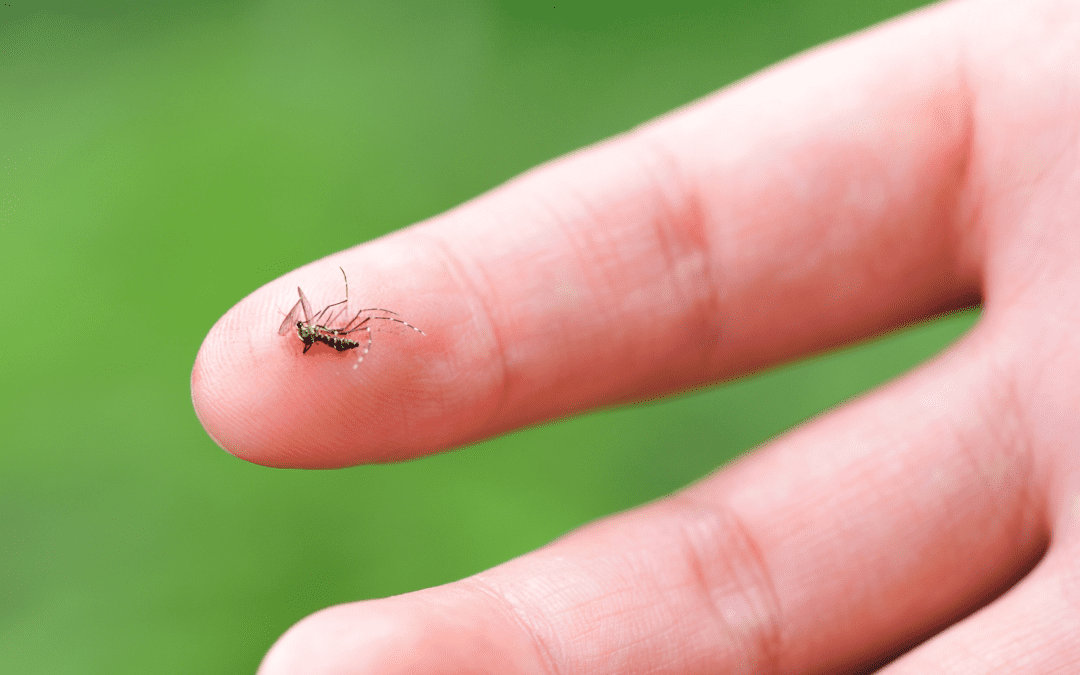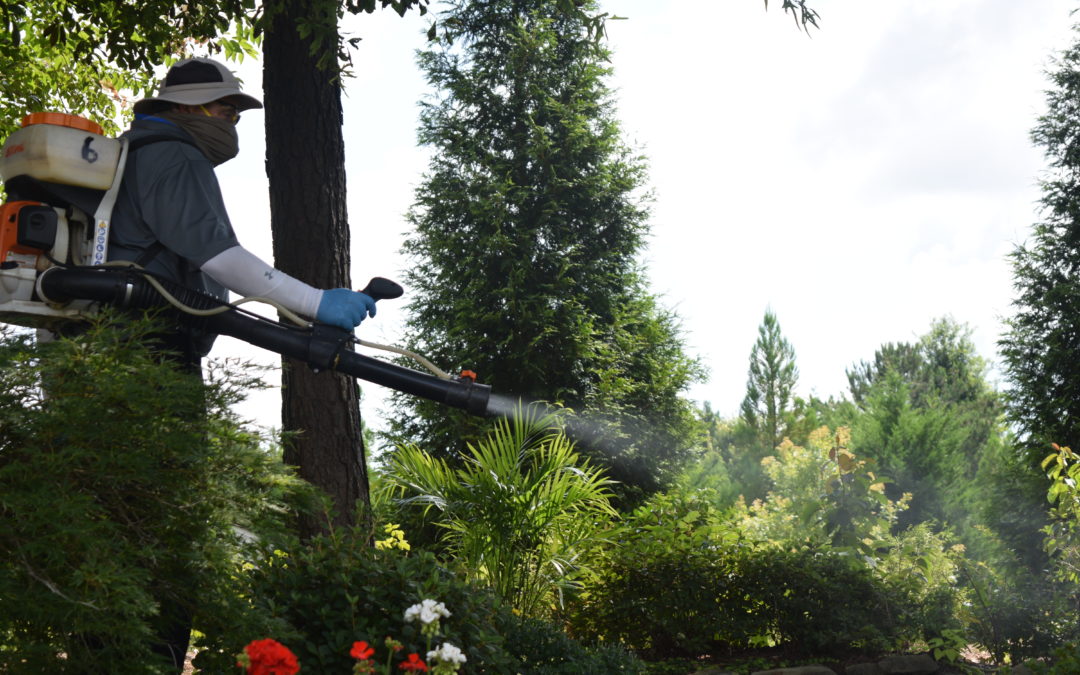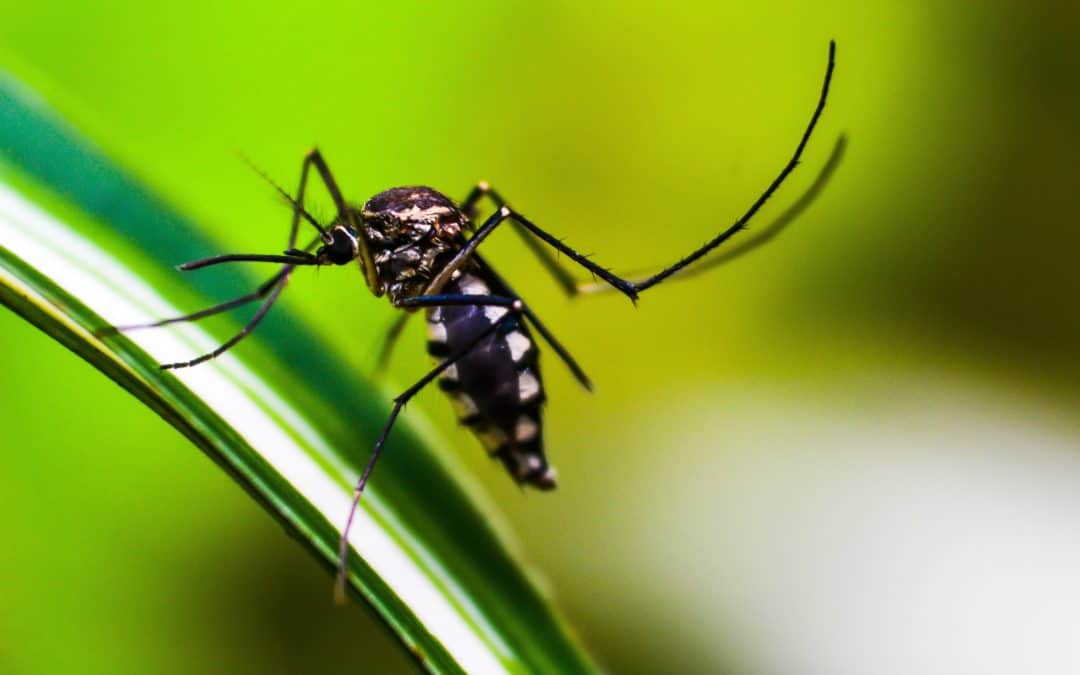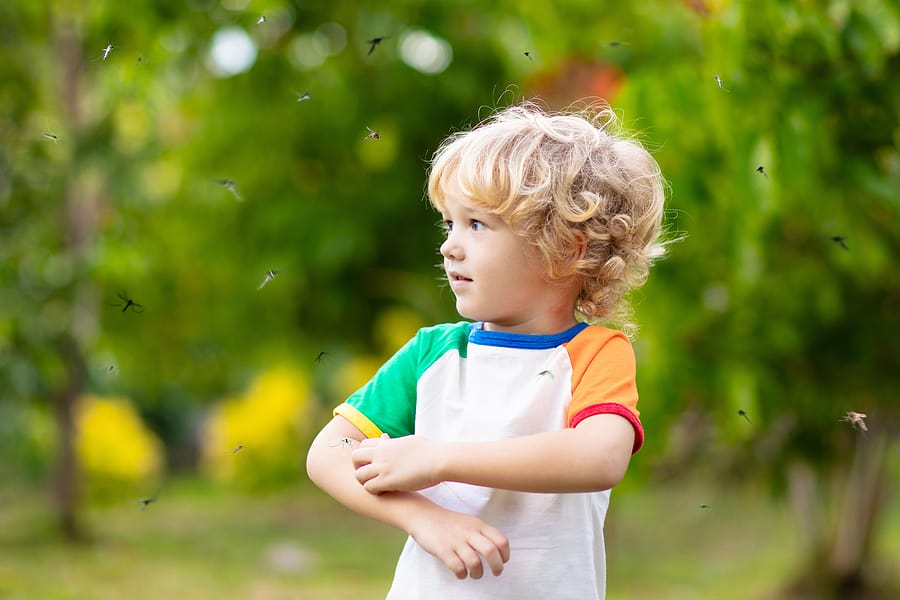READY TO GET STARTED?
REQUEST A FREE ESTIMATE
Fill out the form below or call (888) 466-7849 for a free, no-obligation estimate.

When you think of warmer weather, you imagine barbecues and beach trips. Unfortunately, these outdoor activities can be ruined by mosquito bites. Mosquitoes can put a damper on any summer fun, causing itchy red bumps and spreading diseases such as West Nile virus, Zika virus, and more within the U.S.
Most people are familiar with the maddening, itching sensation of a mosquito bite. But why do mosquito bites itch and why do they bite people in the first place? Let’s break it down.
Only female mosquitoes bite as they need protein to nourish their developing eggs. Biting mosquitoes use several different signals to locate a host, including carbon dioxide that we exhale, heat, and body odor. There are many factors that make some people appear more attractive to mosquitoes than others, including darker colored clothing, blood type, body size, being pregnant, sweat, and skin bacteria.
During the process of a mosquito biting you, it injects some of its own saliva which contains an anticoagulant and specific proteins. The anticoagulant prevents blood from clotting around the mosquito’s mouth. The proteins released by the mosquito trigger the body’s immune system, which releases histamine, a compound that increases cell count resulting in inflammation and swelling. The histamine also signals the nerves around the bite to cause it to itch.
If the mosquito problem is more than you can handle, then contacting your local pest control company might be the next step. as they will help set up the right prevention plan for your home.

Mosquito season peaks in the summer months when the heat, humidity, and summer rain showers combine to create ideal breeding grounds for mosquitoes. Besides those itchy red welts mosquito bites leave behind, they are also known to be vectors for serious diseases like Zika virus and West Nile virus. While traditional mosquito control programs are quite effective at eliminating mosquitoes, there are also green mosquito control options available, as well.
Green mosquito control is an eco-friendly alternative to traditional treatments that utilize plants, flowers and other natural ingredients to provide products that are safe for you, your family, and your pets. Green mosquito products are only applied where they are needed rather than over the entire yard so other beneficial pests aren’t eliminated along with the mosquitoes.
The first step in a green mosquito treatment system is an inspection of your entire yard to identify both nesting sites and resting places that mosquitoes are using. Once these areas have been identified, targeted applications of both larvicide and adulticide are used to help control all populations of mosquitoes. Once this is done, source reduction and elimination is performed by removing any areas of standing water on your property that can be used as a breeding ground. One benefit to mosquito treatments is a service guarantee that ensures a technician will come out between treatments for any issues that arise.
In addition to a scheduled mosquito treatment, homeowners can also take steps to prevent mosquitoes around their homes.
If you have a problem with mosquitoes or any other pests, contact your local pest control company for a free analysis.
Lawn Care: How To Keep Your Lawn Healthy This Summer

Your backyard is a great place to hang out, especially during warmer weather. One pest that can really ruin your good time is a mosquito. Besides being a nuisance, mosquitoes can transmit serious diseases to not only humans but also dogs, cats, and horses. Peak mosquito season runs from April to October. Help keep your family and pets safe with these mosquito prevention tips for warmer weather.
Mosquitoes breed in standing water and only need a thimbleful to start the process. Eliminating potential breeding sites (also known as source reduction) will help keep mosquitoes out of your yard. Identify any low areas that are prone to flooding or pooling water and fill them in with dirt or remulch them. Empty birdbaths daily and refill them. Keep gutters clear of debris. Turn over and remove water from anything that can collect it including pots, tarps, toys, furniture, old tires, pet bowls, etc. Fix any leaky faucets, sprinklers, and hoses that can cause water to pool up. Check AC drip pans for standing water. Keep pools maintained and cover or fill hollow tree stumps.
Clogged gutters can lead to standing water, attracting mosquitoes who are looking for a place to lay eggs. Keep your gutters clear of debris or consider installing gutter guards to help prevent clogs. This can also help prevent other pests, as well.
For larger water features that can’t be eliminated, treat them with larvacide that will eliminate any mosquito larvae that is present. Use it in any areas of standing water such as ponds, water features, and swimming pools.
Mosquitoes love to hide in tall grass, shrubbery, and damp woodpiles. Keep your grass mowed short and your landscaping well maintained. Keep wood piles covered or store wood in containers with lids.
Mosquitoes are attracted to carbon dioxide and body heat. If you have to spend any time outdoors, consider using outdoor fans to help dissipate and redirect the carbon dioxide and body heat you emit. This helps make you less attractive to mosquitoes in the area.
Some common flowers and plants actually make great natural mosquito repellent. Planting these flowers around your home will help keep mosquitoes at bay. Marigold is one of the most common mosquito-repelling plants. Others include lavender, rosemary, basil, catnip, lemon balm, peppermint, and pennyroyal. Citronella grass is also a good option as it is extremely easy to maintain and can be used to fill in large areas.
Yes, you read that correctly! Bats eat thousands of mosquitoes each day. While this may not be an ideal solution if you live in a neighborhood or in close proximity to your neighbors, it is a great alternative for those with larger properties. You can build a bat house to attract them to your yard and watch the mosquitoes disappear.
Fighting mosquitoes can seem like a never-ending battle despite your best efforts. There are traditional and green mosquito control options available today. Most professional mosquito elimination services will include treatments that target both adult and larvae, as well as source reduction and elimination techniques. These services are typically monthly during peak mosquito season. If you have a problem with mosquitoes, contact a professional pest control company for a free estimate.
Avoiding Cockroaches This Spring
Spring Swarmers: How to Prepare for Termite Season

Mosquito season is right around the corner! Heat and humidity during these months combine to provide an ideal environment for mosquitoes to thrive. The season usually starts in the spring and peaks over the summer. Besides leaving behind itchy, red welts, these nuisance pests are dangerous to humans by vectoring serious diseases like Zika virus, West Nile virus, and chikungunya. Fortunately, there are several green pest control options you can utilize as an eco-friendly alternative to control mosquitoes. Here are 3 steps you can take for green mosquito control.
The first step to controlling mosquitoes is identifying and eliminating what attracts them in the first place. Mosquitoes will come around in search of two things: nesting sites and resting sites.
Where do mosquitoes breed? Every species of mosquito lays its eggs in water. While the type of water source may vary between species, it only takes a minute amount of water for mosquitoes to hatch and develop. Get rid of any potential breeding sites by:
Once mature, adult mosquitoes will often rest in shady areas that are protected from the wind. Some common resting sites include trees, shrubs, potted plants, patios, and front entryways.
Any time you can protect yourself from mosquito bites you should. Prevent mosquito bites by:
Yards and climates vary across the region so the effectiveness and longevity of mosquito treatments will vary from home to home. Regardless of where you live or what kind of home you have, a green mosquito control program can be effective at helping control mosquito populations. Green mosquito control utilizes eco-friendly products that are just as effective as traditional products.
A complete green reduction program includes monthly mosquito treatments during mosquito season. Green treatments use products that are derived from flowers and botanicals and area only applied to the areas where they are needed instead of over the entire yard. They are effective at reducing both adult and larvae populations.
The green mosquito reduction program includes an inspection to identify resting and nesting sites; larvacide and adulticides to target all aspects of the population; source reduction and elimination by removing any areas of standing water; and a service guarantee where they will come back between treatments if needed, usually at no cost.
If you have a problem with mosquitoes or any other pests, contact a professional pest control company who can provide you with a thorough inspection and the most up to date traditional pest control and green treatment options available for you.
Termites: Prevent Before They Infest!

Mosquitoes, known to be a top summer nuisance pest, are a huge problem when they invade your property. With consistently heavy rains and warm temperatures, it seems like these insects never go away. Why is it that these pests seem to come out excessively when it’s hot and raining?
It’s important to note that mosquito activity can vary from region to region, depending on the temperature of the area. Mosquitoes are cold-blooded insects; therefore, these pests won’t disappear until temperatures are consistently below 50 degrees. In areas of high temperatures, mosquito activity increases making summer peak mosquito season. Because of this, if it’s warm in the area you live in you’ll most likely see mosquitoes around.
When it comes to the rain, mosquitoes aren’t particularly attracted to the actual rainfall, but instead to what the rain leaves behind. Standing water brings mosquitoes for one reason – a place to lay their eggs. The water that’s left behind from rain provides the ideal place for their eggs to survive and hatch. It’s important to note that if any water is left undistributed for a long period of time, the eggs laid will eventually hatch and create even more mosquitoes to invade your property.
While rain and heat are inevitable during the summer months, they don’t mean there isn’t a solution to prevent mosquitoes. Here are some easy ways you can keep mosquitoes away from your property,